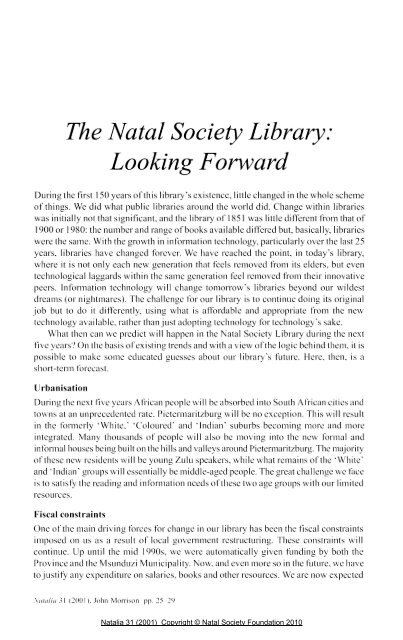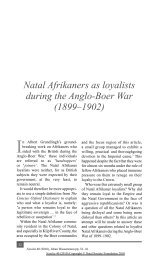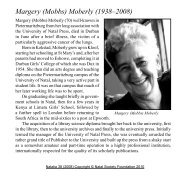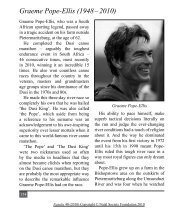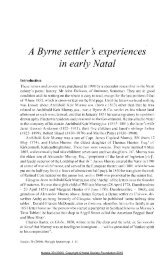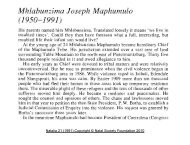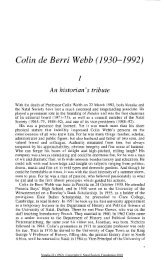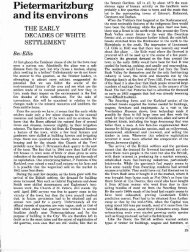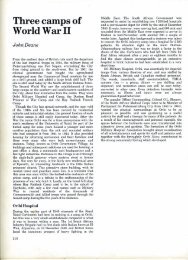The Natal Society Library - Pietermaritzburg Local History
The Natal Society Library - Pietermaritzburg Local History
The Natal Society Library - Pietermaritzburg Local History
You also want an ePaper? Increase the reach of your titles
YUMPU automatically turns print PDFs into web optimized ePapers that Google loves.
<strong>The</strong> <strong>Natal</strong> <strong>Society</strong> <strong>Library</strong>: Looking Forward During the first 150 years ofthis library's existencc, I ittle changed in the whole schemeof things. Wc did what public libraries around the \vorld did. Change within librarieswas initially not that significant, and the library of 1851 was lillle different from that or1900 or 1980: the number and range of books available differed but, basically, librarieswere thc same. With thc growth in information technology, particularly over the last 25years, librarics have changed forcver. Wc have reached the point, in today's library,where it is not only each new generation that feels removed from its elders, but eventechnological laggards within the same generation feel removed from their innovativepeers. Information technology will change tomolTow's libraries beyond our wildestdreams (or nightmares). <strong>The</strong> challenge for our library is to continue doing its originaljoo but to do it differently. using what is affordable and appropriate from the ne\\technology available, rather than just adopting technology for teehnology's sake.What then can we predict will happen in the <strong>Natal</strong> <strong>Society</strong> <strong>Library</strong> during the nexttive years'! On the basis ofexisting trends and with a view ofthe logic behind them, it ispossible to make some educated guesses about our library\; future. Here, then. is ashort-term forecast.UrbanisationDuring the next ti\(: years African people will be absorbed into South i\l'rican cities andtowns at an unprecedented rate. <strong>Pietermaritzburg</strong> will be no exception. This will resultin the formerly 'White: 'Coloured' and 'Indian' suburbs becoming mon: and moreintegrated. Many thousands of people \vill also be moving into the new torm,d andinliJrmal houses being built on the hills and \cdleys around Pictermaritzburg. <strong>The</strong> majorityorthese new residents will be young Zulu speakers, while \\hat remains of the 'White'and' Indian' groups will essentially be middle-aged people. <strong>The</strong> great challenge we faceis to satisfy the rcading and information needs ofthesc two age groups with our limitedresources.Fiscal constraintsOnc of the main dri\ing forces tor change in our library has been tile liscal constraintsimposed on us as a result of local govell1ment restructuring, <strong>The</strong>se constraints willcontinue. Up unti I the mid 1990s. wc were automatically given funding by both theProvince and the Msunduzi Municipality. Now, and even 1110re so in the future, we haveto iu~ti I~' any expcnditure on salaries, books and other resources. Wc are now cxpected<strong>Natal</strong>ia 31 (2001) Copyright © <strong>Natal</strong> <strong>Society</strong> Foundation 2010
26 <strong>The</strong> <strong>Natal</strong> <strong>Society</strong> LibralY: Looking Forwardto serve the needs of more people with less money, fewer books and fewer staff. Whilemany talk about addressing our users' ne:ds by looking at what is happening globally,we have to balance what is needed locally with what we can afford.MembersCitizens ofMsunduzi Municipality ovcrwhelmingly affirm the use ofthe <strong>Library</strong> and itsresources. Our membership database now contains the names of 56000 members, andas many as 4 000 people use thc Main Hranch each day. <strong>The</strong>se figurcs will continue togrow as parents and teachers recognise the value of the <strong>Library</strong> to their children. Ourlibrary has been open to all races since 1975. All people living or working in what wasgreater <strong>Pietermaritzburg</strong> have been encouraged to join the library since that date.<strong>The</strong> collapse of apartheid, therefore, did not result in an influx of new members,mainly because the barrier to membership was a lack of transport. What will increasemembership will be the construction of branch libraries in areas such as Imbali,Willowfountain and Azalea, which arc far from the City Centre. In terms of eurrcntlegislation, the provision or public library services is the joint responsibility of the Provincial<strong>Library</strong> Service and thc municipal councils, with the former providing librarybuildings and book stock, while the latter are responsible for staffing and maintcnancc.Although grants to construct librarics arc available from the KwaZulu-<strong>Natal</strong> Provincial<strong>Library</strong> Services, the Msunduzi Municipality is rcluctant to commit itsclfto providingfunding for statl and maintenance. Following the second democratic municipal election,the rural people from Vulindlela and Sweetwaters were also absorbed into themunicipal boundaries. <strong>The</strong>se people have never had access to libraries and live up to 20km away from our nearest branch. Thus the poorest with the least resources have thefurthest to travel should they want to use a library. This is something we are in theprocess of remedying by investigating the construction of a libralY at Vulindlela.New Technology<strong>The</strong> new technology that cvolved during the closing years ofthe 20th century was thoughtto be the one great threat to the printed \vord. For years, library literature suggestcd thatprinted materials would slide into oblivion. However, the effect of the nc\v tcchnologyon the reading and learning process has been negligible thus far. In fact S01llC elcmentsof electronic publishing havc the potcntial to make a positive contribution, which Imention below.e-booksAdult lending will continue doing very much as it has always done, and will not bebothered with gimmicks. By 2002 Penguin will have 200 e-book titles available. <strong>The</strong>Penguin website will be the primary retail outlet for these books as well as the hand-heldreaders needed to read them. [ do not think this will have much impact on the library. Wewill continue supplying our rcaders with the same type of printed books provided 150years ago.PeriodicalsDuring the year 200(), 814 of the Legal Deposit periodicals received by the libraryceased publication. <strong>The</strong> state of the economy was probably the main reason tor this
<strong>The</strong> <strong>Natal</strong> <strong>Society</strong> <strong>Library</strong>: Looking Forward27significant dccline, but there is another reason: more and more organisations, societiesand busincsses are distributing their publications through the Internet. By doing this,they save on papcr, printing, postagc and labour costs. This change to electronic Internetpublishing will escalate ovcr ti me. A significant segment ofour cultural heritagc \Vi II bclost forever as costs make it impossible for our Legal Deposit department to print, bind,accession and store each document recei\'ed in this way. Our library, togcthcr with SouthAfrica's other four Legal Deposit libraries, is going to have to find a way to prescrvethis information.c-Pcriodicals Oil SABINETSABIl\ET. the national bibliographic database, has identitied 35 periodicals which willsoon be available to subscribers as a full text online resource. No longer will librariesneed to subscribe to hard copies of a journal and pay for the costs associated withbinding, storage, preservation and retrieval.Initially, academic, legal and medical journals will become available to what is alreadyan Internet-literate audience. Later, the more popular periodicals such as Getawayand Living & LOl'il1g will be added. Most South African acadcmie journals arclikely to be available in online form within three years.This too could have an effect on our Legal Deposit collection. Should SJ\BIN ETguarantee to keep the text for an inddinite period, we might no longer be required topreserve the hard eopy in the Legal Deposit Collection.Ref'crcllce BooksReference books and encyclopaedias in print are being put out ofbusiness by the Internetand CD Rom. This shift underlines the importance of the educational and informationseekinguse of the Web.Some ofthe Reference books to which this library has subscribed for over 100 yearscould well be cancelled. For instance the information available in Wisdcll Cricketers'Almanack and Wlzi/a!.cr:" Almlll1l1ck might well be available through subscription in ebook form. We might also tind the required information on certain frec websites.InternetIt is becoming clear that our users want the library to do different things. In order toremain relevant, the reference <strong>Library</strong> has gradually begun catering for adults and childrenwho require the Internet for their information needs.<strong>The</strong> structure and organisation of infonnation on the Internet makes it impossiblefor a novice, and almost impossible for the expert, to find what is relevant to them withthe multiplicity ofsources available. At present more than onc billion pages exist on theWeb. We will thus also have to provide advice on the use of web browsers and searchengines. <strong>The</strong> search engine Cooglc gets 13 million queries per day, which shows thcusage made ofthis system.<strong>The</strong> introduction ofthc Internet has led to a crisis of confidence for some staff (includingmyself) who find working \"ith computers frightening. <strong>The</strong>y also feel intimidatedby children who know more about thc technology than they do. Idcally, wc need acomputer trainer to bridge this gap, both for our staff and users. Unfortunately it iseasier to motivate for computer hardware than for the salary of a trainer.
28 <strong>The</strong> <strong>Natal</strong> <strong>Society</strong> <strong>Library</strong>: Looking ForwardTextbooksTextbooks will continue to be published in book fonn, but gradually over the next fiveyears the e-book format will begin to grow. Students will be able to order the entirebook or any selected chapters via the Internet at a price. E-textbooks used online ()J"downloaded from the Internet will bypass the bookseller and also be much cheaper.This will change the t~lce ofthe book business as it will destroy the traditional text bookretailer entirely. No longer will the publisher have to bother with glossy covers andexpensive binding. High-speed printers in libraries, or the futuristic new e-book store.will replace photocopy machines. <strong>The</strong>se high-speed printers will also be equipped tobind whatever portion of the book is purchased. This method of acquiring textbookswill soon be implemented at Stellenboseh University <strong>Library</strong>.We will continue buying the traditional textbooks as it is impossible to cater for allour users by means of computers in the library, and most of our users do not havecomputers at home.Strategic Partncrs/z IllSCl TNIPOnc only has to \isit a uni\ersity or special library to sec that information technologyhas now out-distanced the wider community's ability to cope with it.We arc extremely fortunatc that in Pictennaritzburg over 30 libraries ha\e joined aUniversity of <strong>Natal</strong> initiati\e called CATNIP to share resources. This has enabled allpartners within the CATNIP consortium to share books. cataloguing, skills, trainingand, most importantly, the URICA library system. Symbiotic and resource sharing relationshipsestablished at local level will grow as budgets shrink and skills become scarce.CO/JIfilltcri::.cc/ Lending<strong>The</strong> computer revolution has already transformed guite a few functions in our library.In the future it could be possible to save on stalT time by having the public check outtheir own books at an autull1ated issue desk. Onc disadvantage would be that membersof the public would no longer be able to develop friendships with library stafT 0\ er thecheckout counters. rhis cuuld lead to the perception that eUl1lputcrs have adepersonalising elTect on ulIr library, whereas they would in fact be ,mm!:,- the librarymoney by taking over !llany routine tasks and doing them quickly, accuratcly and chL'aply.This would allO\\ the remaining stall to otTcr the public the servicc they expect anddeserve.Current CrisesBook Budgc!Thc grant given to thc library by the Msunduzi Municipality to purchase books hasremained the S,ll11e for the past three years. This crisis is made worse hy the fact that therand has depreciated signi ficantly against the US dollar and sterling b'om where themajority ofour purcha,es come. Municipal budgets re!leet the priorities ofthe moment.and libraries arc not high nn the agenda of the Msunduzi Municipality.Without sufllcient funds I'or an adeqllate supply of new books to prO\ide tile latestinformation, to inspire and slI,tain human creativity and endeavour. and to enCOUf
<strong>The</strong> <strong>Natal</strong> <strong>Society</strong> <strong>Library</strong>: Looking Fonvard29their right to the latest infoD11ation, and the whole community will consequently beimpoverished. This policy is particularly damaging to children, as the EducationDepartment's OBE policies place libraries at the centre ofeducation and Iifclong learning,yet neither schools nor our library have the resources to implement this policy. <strong>The</strong>financial position of this library will get worse over the next five years. As \ve arcunable to purchase as many new books as we used to, a special effort will bc made topromote the use of the c"isting book stock in our stack room.Slat!<strong>The</strong> entire library system is in the process ofbeing overhauled. Restructuring workshopsfor the library council, management and staff have been held and a new structure hasbecn implemented. <strong>The</strong> result will be fewer but better utilised staff.Our staff complement has dropped from 107 staff to ]X at present. Had we nottl'ozen the above 30 posts, the library service would essentially have been bankrupt.I nformation LiteracyOne ofthe challenges <strong>Natal</strong> <strong>Society</strong> <strong>Library</strong> management and staffface in the next fiveyears is to ensure that the gcneral community does not continue to fall behind in terms ofinformation literacy. <strong>The</strong>rc is a huge 'skills divide' evolving between rich and poorwhich we cannot bridge because orour limited resources. We barely cope with supplyingbooks. and even if wc had the money to purchase the latest technology, the majority ofour users either don't know about it, want it or care about it. As a result, the technologywould not be optimally used. To be proficient, staff need to utilise thi s technology everyday. Staff also need to have time to be trained and to train the public in the use of thistechnology.<strong>The</strong> underlying ethos ofdemocracy accepts that fi'ee access to information is essentialfor an informed society. Clearly the public library has a vital role to play in thisregard. thereby ensuring that the potential dangers ofthe information divide arc avoidcd.Despite profound changes. the library remains an institution with the same ethos thatits founders envisaged 150 ycars ago. \l1/e will promote literacy, stimulate the imagination,expand personal horizons and also inform and empower citizens with rclevantinfoD11ation. Additional services such as the stuC:y areas, Housebound. Travelling <strong>Library</strong>and the Music <strong>Library</strong>. as \\ell as the Children's Reference <strong>Library</strong>. help makc thelibrary more attractive to users. <strong>The</strong> core of our business will remain the printed book,as it is still thc 1110st convenient, attractive and accessible tool oflcarning, and the onlysensible way of reading for pleasure.JOHN MORRISONDirector, <strong>Natal</strong> <strong>Society</strong> <strong>Library</strong>


